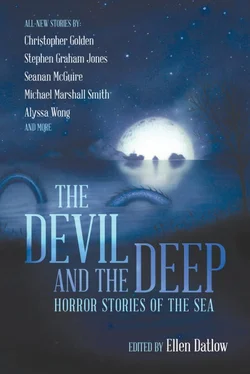“It’s time, Dave. It’s time.”
I took the thing, hardly knowing what I’d been given at first. But as I prepared to throw it down to the wet rocks that came and went amid the heaving whitewater below, I found I could speak of it at last.
“Brooke’s skull, not Farday’s. Captain Brooke’s, you hear? Farday’s ghost borrowed it, possessed it, treasured it, anything so he could come home.”
Will had known to lean in close. “You’re sure?” he called above the roar of the rotors and the ocean.
“Two ghosts fighting over a single skull.”
Then I let it go, felt my twin guests leave me, slip away, saw the skull’s jaws snap wide in a scream or a shout, what it looked like, though how could we ever know? But for me it was to bite something so they were locked together, fiercely and forever, going to whatever home they could find for themselves in that harsh and unforgiving sea.
THE WHALERS SONG
RAY CLULEY
Sebjørn squinted against the pale light of the midnight sun. The sky was cloudless. There was no wind. The sea was still and vacant, except for where it frothed against the hull of the Höðr , splitting around them into a wide V of wake. It was so quiet that Sebjørn had become aware of the throbbing noise of the boat’s engine, a sound so familiar that he was usually as ignorant of it as he was the pump-thump of his own heartbeat. The regularity of his breathing.
At the bow, Aaron leaned on the barrel of the harpoon cannon. He, too, searched the sea. He wore binoculars around his neck and occasionally he used them, but only briefly.
In the crow’s nest, Sigved used his more frequently. He wore his bright orange waterproof, as if he’d seen rain the others had yet to notice. He wore the hood up, cords pulled so tight that it puckered around his face, and he held the binoculars at what little gap remained.
Brage and Nils—one port, one starboard—also looked to the water. Searching, like the others, for a plume of expelled spray. The run-off from an arching back. Maybe birds, sitting on the water, bobbing to eat krill.
There was nothing.
In the wheelhouse, Osvald held them steady. Grim-faced but fierce when others might be sullen. A suitable expression for a captain yet to catch his first whale of the season; of the thirty to forty they were set to catch this year, the crew of the Höðr had none.
Minke whales are the smallest of the baleen whales and can remain submerged for twenty minutes at a time. They barely breach when they come up for air, nor do they bring their flukes from the water when they dive. It makes them difficult to spot. For a species so apparently great in number—enough, at least, to be considered sustainable—they were proving to be frustratingly elusive this year.
Sebjørn checked his watch. Another day would soon be over. Another night. He clapped his gloved hands together a couple of times and rubbed them. Not because he was cold but because the gesture felt decisive. Come on now , he thought. Show us something. Give us something to take home.
Nils, standing close beside him, chose that moment to begin singing. Not a whaling song, but a traditional fishing song. His father, he’d said, had been a fisherman, but then every whaler was a fisherman in the winter.
The men on the Höðr knew the song.
Brage turned and smiled at Nils, smiled at Sebjørn, and added his deep voice to the chorus. Sebjørn mouthed the words as well, quietly at first but gaining enthusiasm with the others. Aaron, at the cannon, waved his arms to conduct an imagined orchestra and they sang of the rise and fall of the sea, of the catch and the haul, driven by a rhythm meant to ease hard work, though they had none.
A sudden whistle, brief and shrill, cut the song short. Sigved had the binoculars at his face but was holding them with only one hand; with the other he pointed.
There. A small cloud of spray. The mist of a blowhole, spouting. It settled quickly on such a windless day, drifting just enough to indicate a direction of movement.
Sebjørn offered Sigved a thumbs up. The man nodded, unclipping the radio from his belt and calling through to the captain, but Osvald was already steering the boat around. The men cheered as the vessel turned. This was it. At last, the thrill of the hunt.
There was another eruption of spray ahead and a dark shape emerged from the water before slipping back under.
There were two of them.
Aaron readied himself at the harpoon cannon. Brage took one of the rifles from the nearby rack. He wouldn’t need it. The harpoon was grenade-tipped, designed to explode inside the whale’s brain, and Aaron was a good shot.
The blast of the cannon shuddered through the deck. The Höðr was a small vessel and all of it trembled when the gunner fired. Sebjørn, resting against a rail, felt it thrumming as he watched nylon wire unravel behind the harpoon. Heard it hiss its sizzling echo to the sudden thunder that had launched it.
The whale turned and, with a final wave of fin, it rolled. Raised its side to the sky. Its pale underbelly.
Brage lowered the rifle.
“Eight meters,” said Nils beside Sebjørn. Sebjørn nodded. Twenty-six, twenty-seven feet. Half the size of the Höðr . About average. But average was good. Small would have been good. Average was very good.
Sebjørn looked to the wheelhouse. Osvald, usually so serious, was smiling. Sebjørn was glad to see it.
A metallic whine from the winch signalled the men to their stations. The nylon cord yanked its slack out of the water, flinging seawater skyward as it pulled taut with the weight of their whale, and Sebjørn clapped his hands together.
“Let’s get to work!”
The minke laid sprawled across the deck, a ragged pulp of meat and blubber where the harpoon had exploded close to the thorax. A good shot. Sebjørn inspected it briefly, nodded at Aaron, and with the others began to carve the animal into pieces.
They would strip several tonnes from the carcass, reducing it to a head and a tail with only bones in between. The tail had been nearly severed already in coming out of the sea, the winch pulling cord through flesh as the whale’s own weight split skin and blubber and muscle down to the bone. The deck was awash with blood. The men were red to their elbows, rubber suits smeared about the chest and waist. Boots sliding in the mess that spread around them.
Sebjørn was in charge of the flensing. He carved blubber into thick strips, handing them to Nils to send below where Brage packed them in ice. Whale blubber was not like animal fat. It was not soft; cutting it demanded strength. Sebjørn was still strong. He enjoyed the work. It was greasy, stinking work, and he was slick with fat and fluids, but it was men’s work and he was happy.
Sigved and Aaron followed Sebjørn’s progress. They drew their knives through meat and muscle, laying each thick chunk on the deck ready to go below. They all worked in focussed silence, save for the grunts and exhalations of their exertions. There were plenty of songs they could have used to accompany, even ease, their efforts, but by some unspoken agreement they worked without them. As if a song would make this routine when the catch was far too special: they would honour it with quiet efficiency. There was chorus enough, anyway, from the birds that had appeared from nowhere, circling and diving and crying their impatience, calling at each other in battle over whatever scraps made it to the sea.
The heavy bulk before the men, thick under their hands and firm against their bodies, uncurled piece by piece until the body was an open wet cavity, red and white and steaming in the cold air. The grey-black whale, skin shining like an oil-slick, was swiftly becoming a length of bones. These would be thrown back to the sea; today’s whaling was concerned only with the blubber and the meat beneath. The blubber would be rendered down to oil. The meat would be eaten.
Читать дальше













